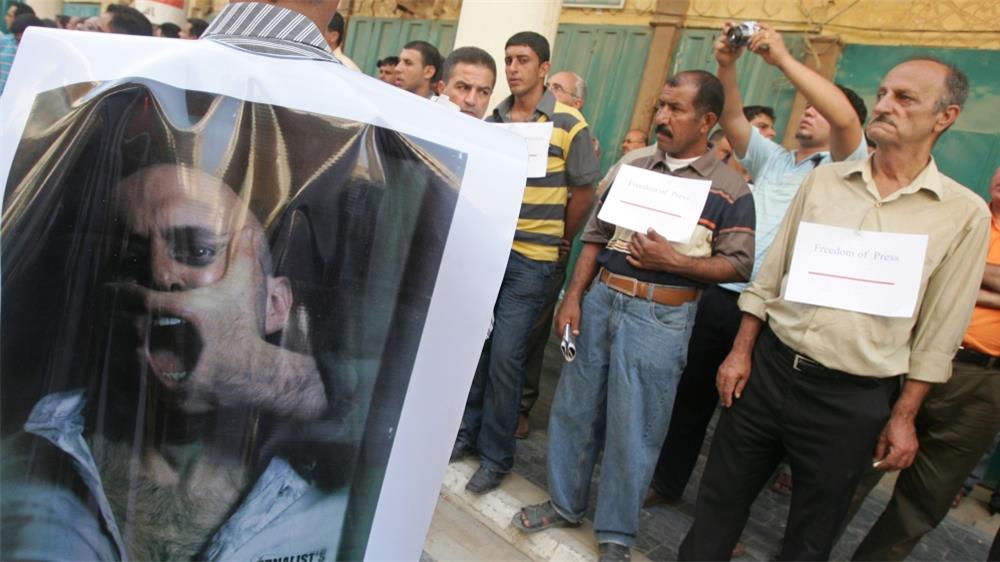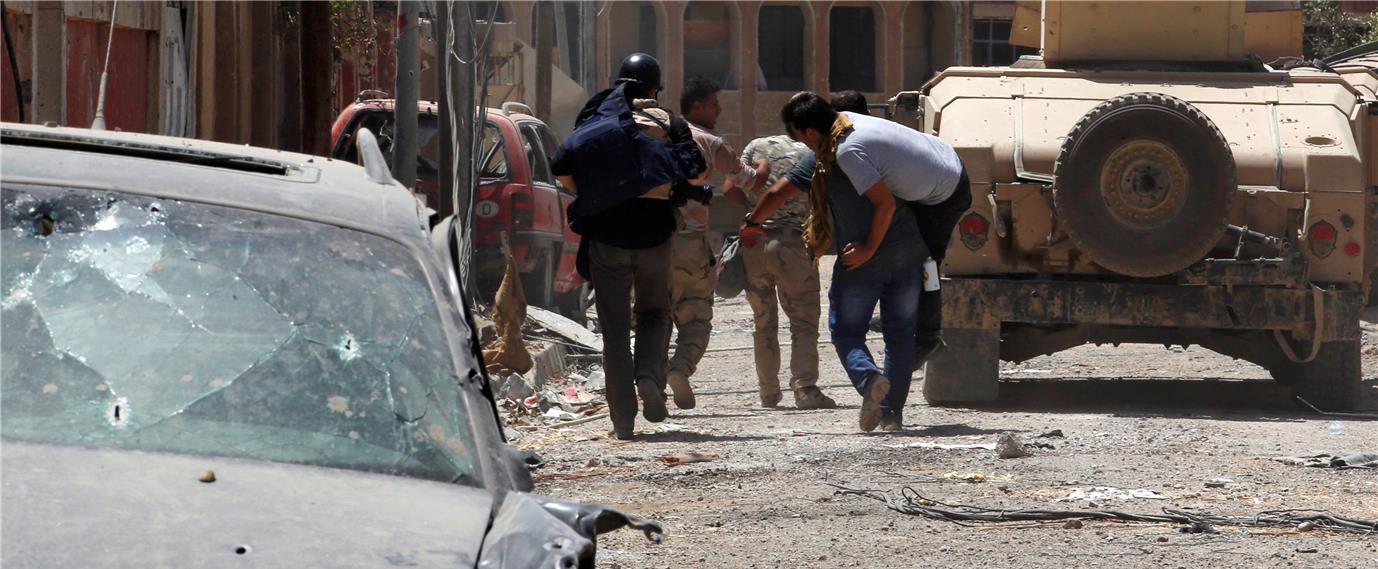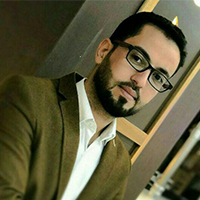يمكن للصحفي العراقي أن يعمل 16 ساعة في اليوم الواحد لصالح مؤسسات إعلامية مختلفة التوجهات. في الصباح مع قناة فضائية بصفة مراسل ميداني يغطي الأحداث السياسية اليومية في البلد، يحدد واجبه بعد اجتماع سريع يجري في الثامنة صباحا وينطلق لإجراء مقابلات مع شخصيات الحدث، ويعود في الظهيرة ليكمل تقريره. يخرج قبل انتهاء الدوام الرسمي بربع ساعة يستفيد منها كوقت مستقطع خلال ذهابه إلى الإذاعة الإخبارية التي يعمل فيها مراسلا أيضا، لكن تحت اسم مستعار حتى لا تستطيع القناة الفضائية اكتشافه متلبساً بجريمة إعداد تقارير لصالح مؤسسة مختلفة معها سياسيا.
لا تقف رحلة صديقنا الصحفي عند الإذاعة، إذ ينطلق منها ليلا للعمل محررا في موقع إخباري حتى منتصف الليل، وبأجر زهيد يكاد يكفي لسد أجور سيارات الأجرة التي يستقلها يوميا للتنقل بين أماكن عمله، فضلا عن تغطية فاتورة طعام الوجبات السريعة رخيصة الثمن، مقارنة بمطاعم الدرجات المتوسطة.

يضطر الصحفي العراقي للعمل في أكثر من وسيلة إعلامية، ما يقتل الجانب الإبداعي في العمل ويؤثر على الاستقلالية والحيادية. شاترستوك.
يشبه عمل الصحفي العراقي صديقه عامل البناء، فلا توجد عقود بينه وبين المؤسسة، وهو محروم من الضمانات الإدارية أو المالية، في حين صيغ قانون حماية الصحفيين بعبارات جميلة ليشكل لوحة تراثية يكسوها التراب على رفوف نقابة الصحفيين. وهنا يلجأ الصحفي إلى ضمانات من نوع آخر.. ضمانات بدائية إلى حد ما، لكنها تكفي لخفض منسوب القلق لديه إلى المستوى المتوسط.
فالعمل في مؤسسات متعددة تبقيه بعيدا عن منطقة الخطر، على الأقل في القريب المنظور، وإذا فُصِل من القناة الفضائية فلديه الإذاعة والموقع الإخباري، ويمكن أن يحصل منهما على مرتّب لا بأس به (نحو ألف دولار)، لكن ذلك يتطلب العمل بسرية وبأسماء مستعارة أحيانا.
خوفا من غضب المدير
محمد العواد (مراسل تلفزيوني ويعمل بإذاعة محلية) يرى في حديثه لمجلة "الصحافة" أن الأجور التي يتقاضاها الصحفي متدنية، مما يضطره للعمل السري مع مؤسسة إعلامية أخرى، وفي بعض الأحيان تعلم مؤسساته المتعددة التي ينتمي إليها بارتباطاته المتشابكة. ويحتاج العواد للعمل في ثلاث مؤسسات ليتمكّن من تأمين عيشه وصحته.
لا قوانين ناظمة -بحسب العواد- لمهنة الصحافة في العراق، بل يسود المشهدَ الصحفي فوضى يتسابق فيها الجميع لحجز مكان في أكثر من مؤسسة إعلامية لضمان الاستمرار في المهنة، فربما يُطرد الشخص بجرة قلم، أو "نزوة غضب" استبدّت بالمدير، حيث تشح المعاملات الرسمية وتسود الاتفاقات الشفهية.
بعض الصحفيين الذين شاركوا في تغطية الحرب ضد "تنظيم الدولة" أصيبوا في المعارك، والبعض الآخر استشهد. يقول العواد الذي شارك أيضا في تغطية تلك الحرب، إن ذوي زملائه الذين استشهد أبناؤهم في المعارك لم يحصلوا على حقوقهم، بينما لم تستقبل المؤسسات الإعلامية زملاءه الجرحى لأنهم لا يستطيعون تنفيذ المهام نفسها التي كانت تلقى على عاتقهم سابقا.
ماكينة عمل
الصحفيون الأشباح لهم أساليبهم الخاصة في تأمين المواد الإعلامية لأكثر من ست مؤسسات في آن واحد. يروي لنا الصحفي حسن نعيم الشنون قصصا عن زملائه الذي يرتبطون بدوام رسمي مع مؤسستين مختلفتين بدوام صباحي وآخر مسائي، كما يعدّون في الوقت نفسه موضوعات لوكالات إخبارية يرتبطون معها بنظام القطعة.
الشنون الذي يعمل مراسلا لصالح موقع "مونيتور" الأميركي، وكان قد أعد تحقيقات استقصائية لشبكة "أريج"، يجد أن الدخلاء على مهنة الصحافة أضافوا ثقلا جديدا وزاحموا الصحفيين الحقيقيين في تخصصهم، إذ لا تطلب بعض المؤسسات خبرة ميدانية ولا حتى مهارة في العمل الصحفي، لا سيما إذا كان بعض المتقدمين يقبل العمل براتب لا يزيد عن 300 دولار فقط، هنا يصبح لمدير المؤسسة مجال كبير للمناورة وقبول أو رفض المتقدمين للعمل، إذ إن جلب خمسة صحفيين أو أكثر من هؤلاء الذين يحملون شهادات تدريبية من مؤسسات وهمية وبأجور زهيدة، أفضل بكثير من صحفي محترف واحد يثقل كاهل الموازنة، لا سيما أن المواقع الإخبارية لا تعطي أولوية للمهنية، فالمسألة لا تتعدى استنساخ أخبار الوكالات العالمية والعربية ووضعها في قالب جديد.
لكن رغم لومه الشديد للمؤسسات الصحفية وإداراتها التي لا تقدر جهود عامليها، يعتقد الشنون أن الصحفي يتحمل جزءا من المسؤولية لكونه يرضى بأن يعمل براتب لا يزيد عن 300 دولار أو أكثر منها بقليل، مما يعطيهم فرصة للتمادي أكثر، ويدفع بالصحفيين الكبار إلى زاوية ضيقة قليلة الاحترام.
ويتفق معدّ البرامج التلفزيونية محمد شفيق مع زميله الشنون في تحميل الصحفي مسؤولية ما وصل إليه الحال في المؤسسات الإعلامية العراقية، لكونه يسكت عن حقوقه، ويخضع للأمر الواقع، مشيرا إلى أن تعدد المهام في أكثر من مؤسسة يقتل الإبداع لدى الصحفي في جوانب كثيرة، كما يقتل قضية الاستقلالية والحيادية.
وبشأن عدد الصحفيين الذين يعملون في دوام مزدوج يقول شفيق إن المشكلة الأخرى في هذا الشأن هي غياب إحصائيات محددة، لكنه يعتقد حسب متابعته أن هناك نسبة كبيرة جدا من الصحفيين الذين يعانون من مشكلة الازدواج الوظيفي.
صحافة موسمية
يرى عدد من الصحفيين الذين التقيتهم أن المشكلة الأساسية للصحافة العراقية هي غياب العمل المؤسساتي، وعدم تفعيل القوانين الناظمة، وقد ساهم الصحفي نفسه في تعزيز هذه البيئة غير الآمنة لعمله، التي يسميها الصحفي حسام الحاج "الدكاكين الصحفية". وهذه البيئة مرتبطة بحركة الأموال التي تمول المشاريع في العراق، وهي في غالبها مال سياسي معرَّض لهزات ونكبات، خصوصا أن المؤسسات الصحفية مشاريع حزبية.
ويقول الحاج الذي يعمل في المجال الحقوقي في حديثه لمجلة "الصحافة" إن تبعية الصحافة للممول السياسي جعلها تخضع للمواسم السياسية، إذ تمثل الانتخابات ربيع الصحافة العراقية، وهذه مشكلة بنيوية أساسية تعرض الصحفيين ومؤسساتهم للابتزاز المالي.
وعن دور نقابة الصحفيين في العراق، يقول الحاج إن واحدة من الفجوات الكبيرة في عمل الصحافة هي وجود نقابة مخصصة للصحفيين، فهي برأيه لا تعرف ما هو العمل النقابي ولا تعرف موقعها من القانون والدستور، وكيف يجب عليها التعامل مع المواقف المختلفة. ويضيف أن هذه النقابة تعتقد أن مهمتها تدجين الصحفيين وتحويلهم إلى مشاريع "روبوتات" للسياسيين، فهي "لا تدافع عن حقوقهم ولا تقدم رؤى محددة، بل تتهرب حينما يتعرضون لمشكلات قانونية".
ولمواجهة حالة الانفلات في المؤسسات الصحفية، أقر مجلس النواب العراقي قانون حماية الصحفيين عام 2011، تضمّن مواد قانونية لو نفذت لانتشلت الصحافة من محنتها. وأبرز ما تضمنه القانون الجديد المادة 13 التي جاء في نصها "تلتزم الجهات الإعلامية المحلية والأجنبية العاملة في جمهورية العراق بإبرام عقود عمل مع الصحفيين العاملين في تلك الجهات وفق نموذج تعده نقابة الصحفيين في المركز أو الأقاليم. ويتم إيداع نسخة من العقد لديها".لكن المشكلة أن المادة 14 من نفس القانون تتخلى عن حماية الصحفي وتحيله إلى قانون العمل، إذ نصت على الآتي "لا يجوز فصل الصحفي تعسفياً، وبخلافه يستطيع المطالبة بالتعويض وفق أحكام قانون العمل النافذ".

صحفيون عراقيون في وقفة احتجاجية للمطالبة بحرية التعبير عام 2009 في العاصمة العراقية بغداد، الوضع لم يتحسن حتى اليوم. تصوير: مهند فلاح – غيتي.
وهكذا، يكون القانون قد أعطى الحق للصحفي لتقديم الشكوى والحصول على التعويض، لكن دون أن يتطرق إلى مسألة منع الفصل التعسفي، بالإضافة إلى أنه لم يتطرق إلى أي عقوبات بحق المؤسسات الصحفية التي تمارس الضغوطات على العاملين لديها.
وحتى لو وجدت نصوص محبوكة تضاف إلى تلك الموجودة الآن، تبقى القوانين عبارة عن لوحات كبيرة لحجب الواقع العراقي عن الرقيب، فلا المواد القانونية الموجودة ساهمت في حماية الصحفي، ولا يمكن للأخرى أن تفعل الأولى، لأن مأساة الصحافة العراقية قُتلت بسيف المال السياسي وكبّلت العاملين في هذا المجال بقيود الإدارات البعيدة عن المهنية.








































